Introduction
Have you ever wondered how contractors get paid for work that cannot be easily priced? In the world of construction, there’s a method called dayworks that allows contractors to be compensated for specific instructed tasks based on the cost of labor, materials, and equipment. Dayworks provide a flexible pricing approach when traditional methods fall short. So, let’s dive into the fascinating world of dayworks in construction and explore their purpose, application, advantages, and disadvantages.
What Are Dayworks and How Do They Differ?
Daywork meaning in the construction industry, refers to valuing work based on the time spent by the contractor’s workers, the materials used, and the equipment employed. Unlike traditional pricing methods that rely on predefined rates, dayworks offer a more dynamic and adaptable approach to compensate contractors. It allows for the payment of work that cannot be easily quantified or priced in a conventional way.
Daywork Examples
Picture this: a contractor is working on a ground excavation project, and suddenly, they stumble upon an unforeseen obstruction, such as a buried utility line. In such situations, dayworks often come into play. Dayworks are typically applied when:
1. Unforeseen Obstructions Arise during Ground Works
During construction projects, unexpected challenges can arise, such as encountering underground utilities, hidden structures, or geological anomalies. Dayworks provide a mechanism to address these unforeseen obstacles by compensating contractors based on the additional labor, materials, and equipment required to overcome them.
2. No Comparative Rates Exist in the Bill of Quantities
A bill of quantities (BOQ) is a document that itemizes the materials, equipment, and labor required for a construction project. However, there may be instances where the work instructed does not have any comparative rates in the BOQ. In such cases, dayworks enable contractors to be fairly compensated for the additional resources employed.
Exploring Pricing Options for Dayworks
Now that we understand when dayworks are typically applied, let’s take a closer look at how these works can be priced. There are two basic options available:
Option 1: Percentage Addition
In this option, the prime cost of the work is determined, which includes the cost of labor, materials, and Plant/equipment. To arrive at the final payment, a percentage is added to the prime cost. This additional percentage accounts for overheads, profit, and incidental costs associated with the project.
Option 2: All-Inclusive Rates
Alternatively, all-inclusive rates can be used for pricing dayworks. These rates are quoted during the tender stage and are included in the contract documents. They encompass the cost of labor, materials, equipment, as well as an allowance for overheads and profit. The all-inclusive rates can either be fixed for the duration of the contract or adjusted periodically based on contract conditions, considering factors such as inflation.
The Importance of Day Work Schedules
Day Work schedules play a vital role in quantifying and pricing varied works that cannot be measured using the standard method of measurement. While a bill of quantities provides a comprehensive list of resources required for a project, it may not account for every unforeseen task or variation that arises during construction. Day Work schedules bridge this gap by capturing and pricing incidental variation works. These schedules enable contractors to accurately estimate the cost of additional resources employed beyond the scope of the original BOQ.
Sample Daywork Schedule In A BOQ
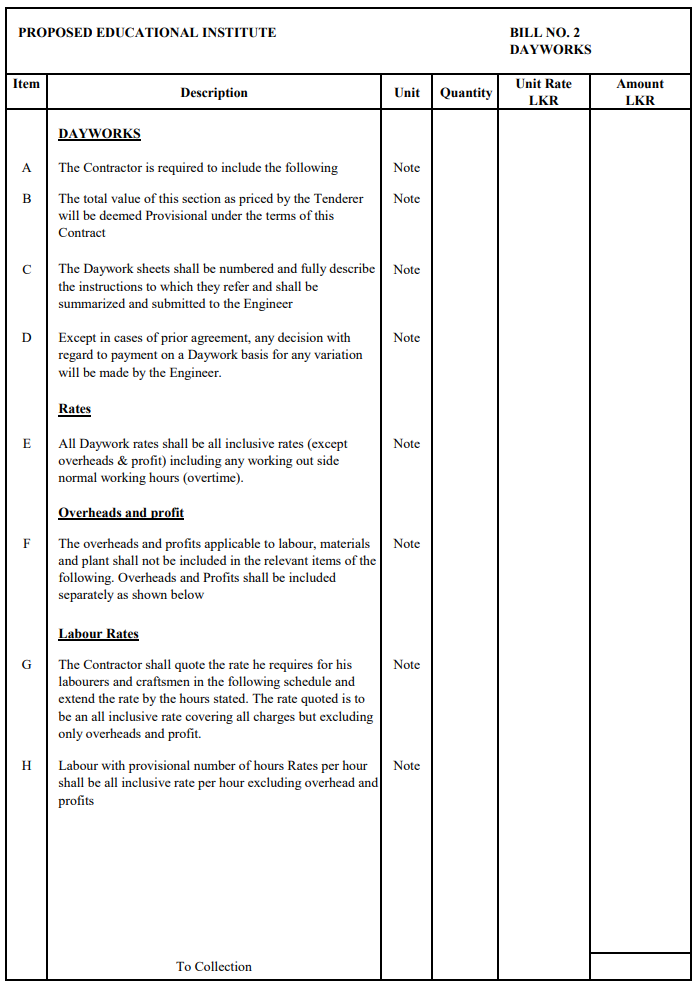
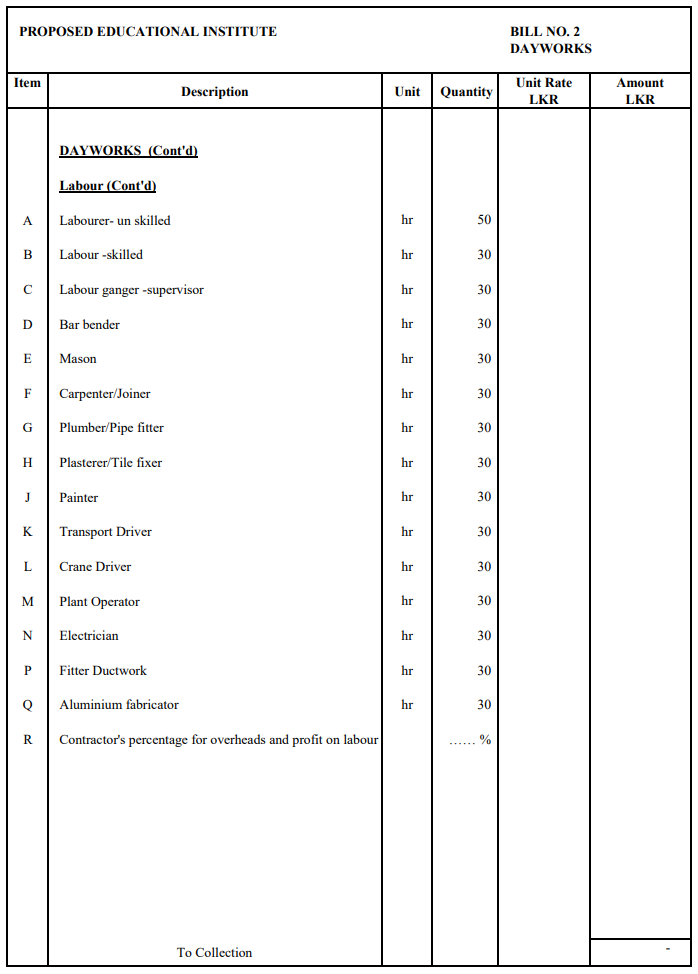
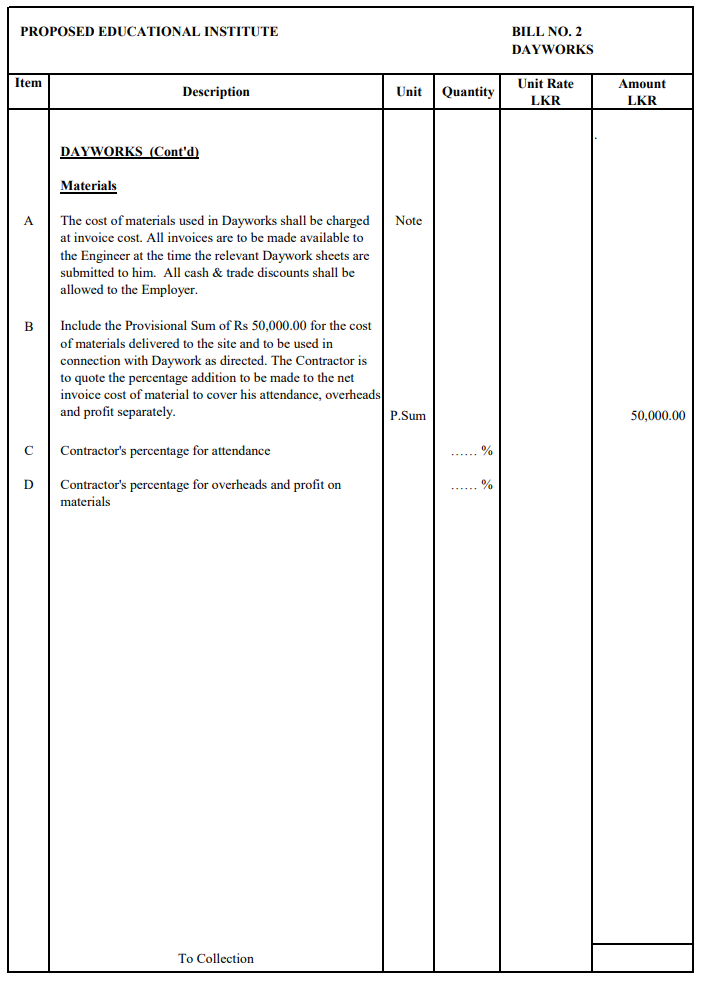
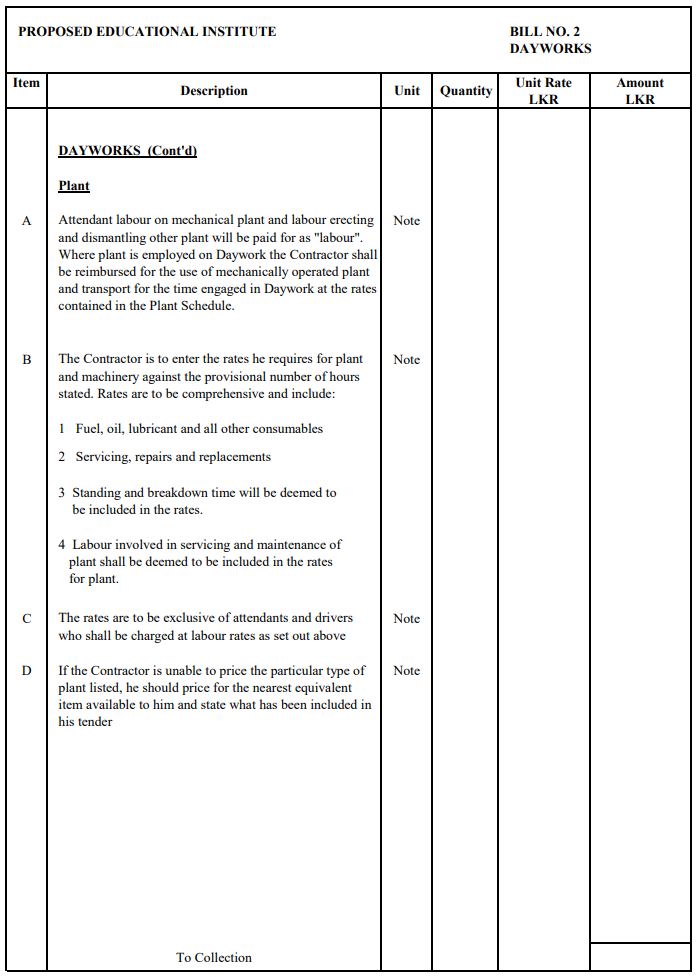
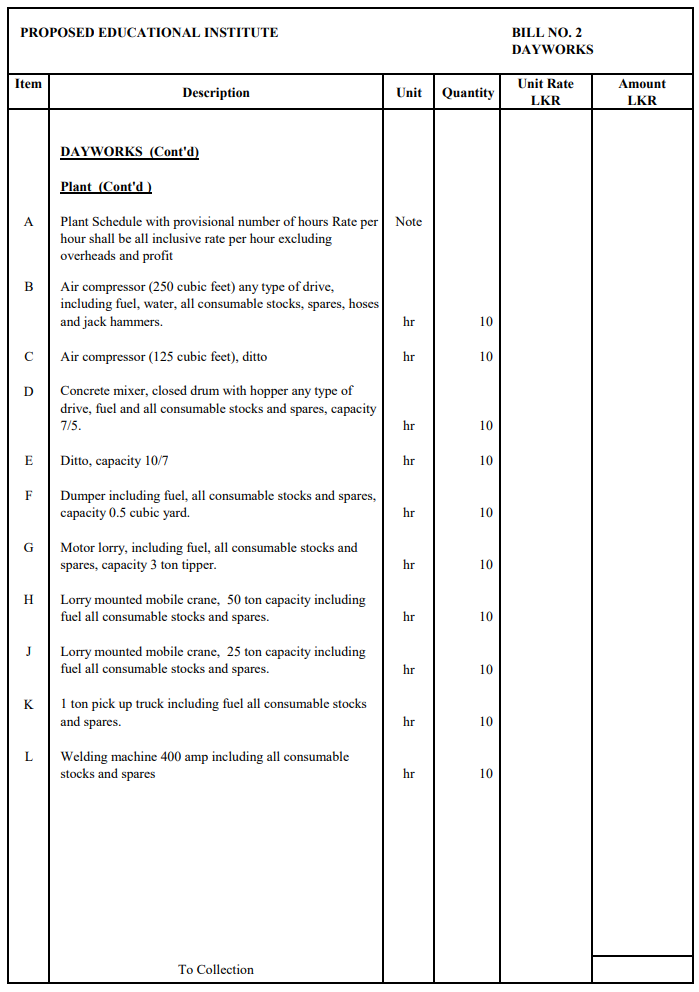
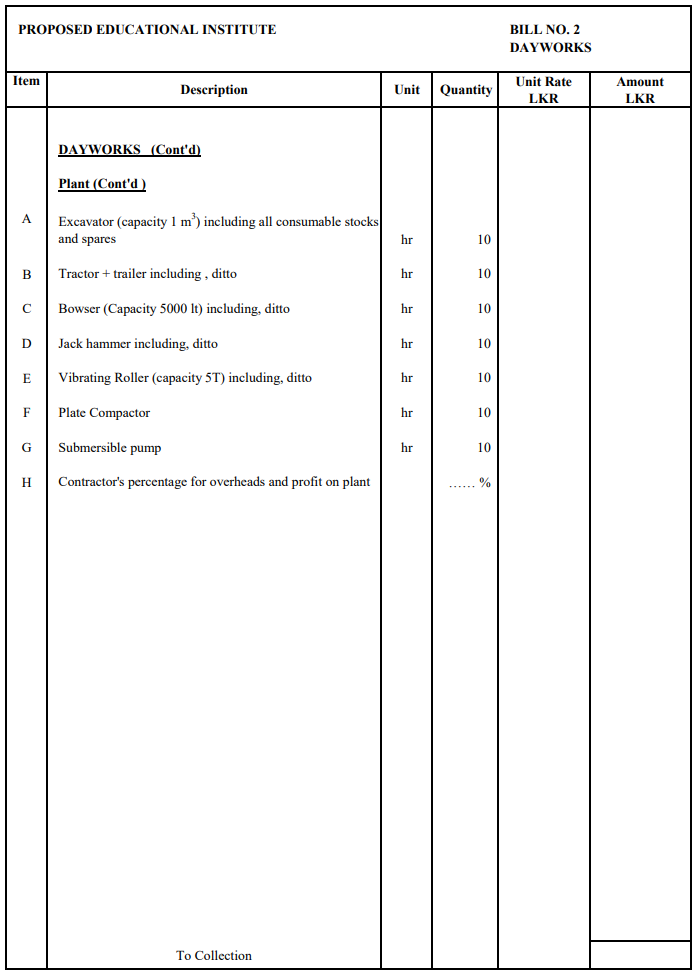
Evaluating Dayworks: The Process
To ensure fair compensation and proper documentation, the evaluation of dayworks involves several steps. Let’s take a look at the typical process:
1. Approval from the Engineer
Before commencing dayworks, contractors must seek approval from the engineer or the client’s representative. This ensures that the work instructed falls within the scope of the project and adheres to the contract terms.
2. Daily Updates and Signatures
During the execution of dayworks, contractors are required to provide daily updates to the engineer. These updates outline the labor, equipment, and materials used, along with any relevant progress or challenges encountered. The engineer’s signature serves as a confirmation of the work completed, allowing for accurate evaluation and subsequent payment.
3. Documentation Requirements
Proper documentation is essential when evaluating dayworks. Contractors should maintain records of the labor and plant hours expended, along with detailed quantities of materials used. These records, along with the engineer’s approval and daily updates, form the basis for evaluating and pricing dayworks.
With the evaluation process complete, contractors can be fairly compensated for the additional resources invested in executing dayworks.
The Pros and Cons of Dayworks
Like any pricing method, dayworks come with their own set of advantages and disadvantages. Let’s explore both sides of the coin:
Advantages of Dayworks
- Flexibility: Dayworks provide flexibility to address unforeseen circumstances or additional work that cannot be easily quantified.
- Fair Compensation: Contractors receive payment based on the actual labor, materials, and equipment employed, ensuring fair compensation for their efforts.
- Real-Time Adjustments: Dayworks enable adjustments in pricing as the project progresses, allowing for accurate cost tracking and management.
Disadvantages of Dayworks
- Lack of Predictability: Since dayworks are based on actual usage, it becomes challenging to predict the exact cost of the project, potentially leading to budgetary uncertainties.
- Increased Administrative Effort: Proper documentation and communication with the engineer are vital for the evaluation of dayworks, requiring additional administrative effort on the part of the contractor.
- Potential Disagreements: Due to the subjective nature of pricing dayworks, disagreements may arise between contractors and clients/engineers regarding the quantity and cost of resources used.
Conclusion
Dayworks provide a valuable mechanism in the construction industry for compensating contractors when traditional pricing methods fall short. By valuing work based on labor, materials, and equipment employed, dayworks ensure fairness and flexibility. While they come with their pros and cons, dayworks offer an essential tool for addressing unforeseen circumstances and pricing additional work that goes beyond the scope of initial project estimates.
FAQs
1. Can dayworks be used for every type of construction project? Dayworks are typically employed in situations where work cannot be easily priced or quantified. While they are commonly used, their application may vary depending on the project and contract conditions.
2. What should contractors do if they encounter unexpected work during a project? Contractors should promptly communicate with the engineer or client’s representative and seek approval for the additional work. This ensures proper evaluation and compensation for the unforeseen tasks.
3. Can dayworks lead to disputes between contractors and clients? Disagreements may arise in dayworks situations due to the subjective nature of pricing and quantifying resources. Clear communication, documentation, and a cooperative approach can help mitigate potential disputes.
4. Are dayworks more commonly used in specific construction sectors? Dayworks are prevalent across various construction sectors. However, they are often utilized in civil engineering projects, groundworks, and situations where the work’s complexity or unforeseen nature necessitates flexible pricing.
5. Are dayworks only applicable to large-scale construction projects? Dayworks can be used in projects of any size, as long as the work instructed falls within the scope of the contract and cannot be easily priced using traditional methods.






